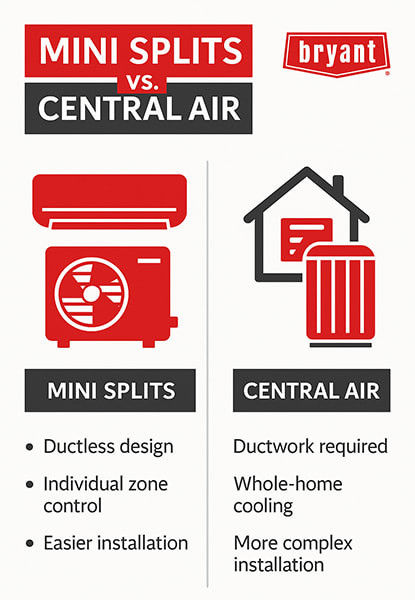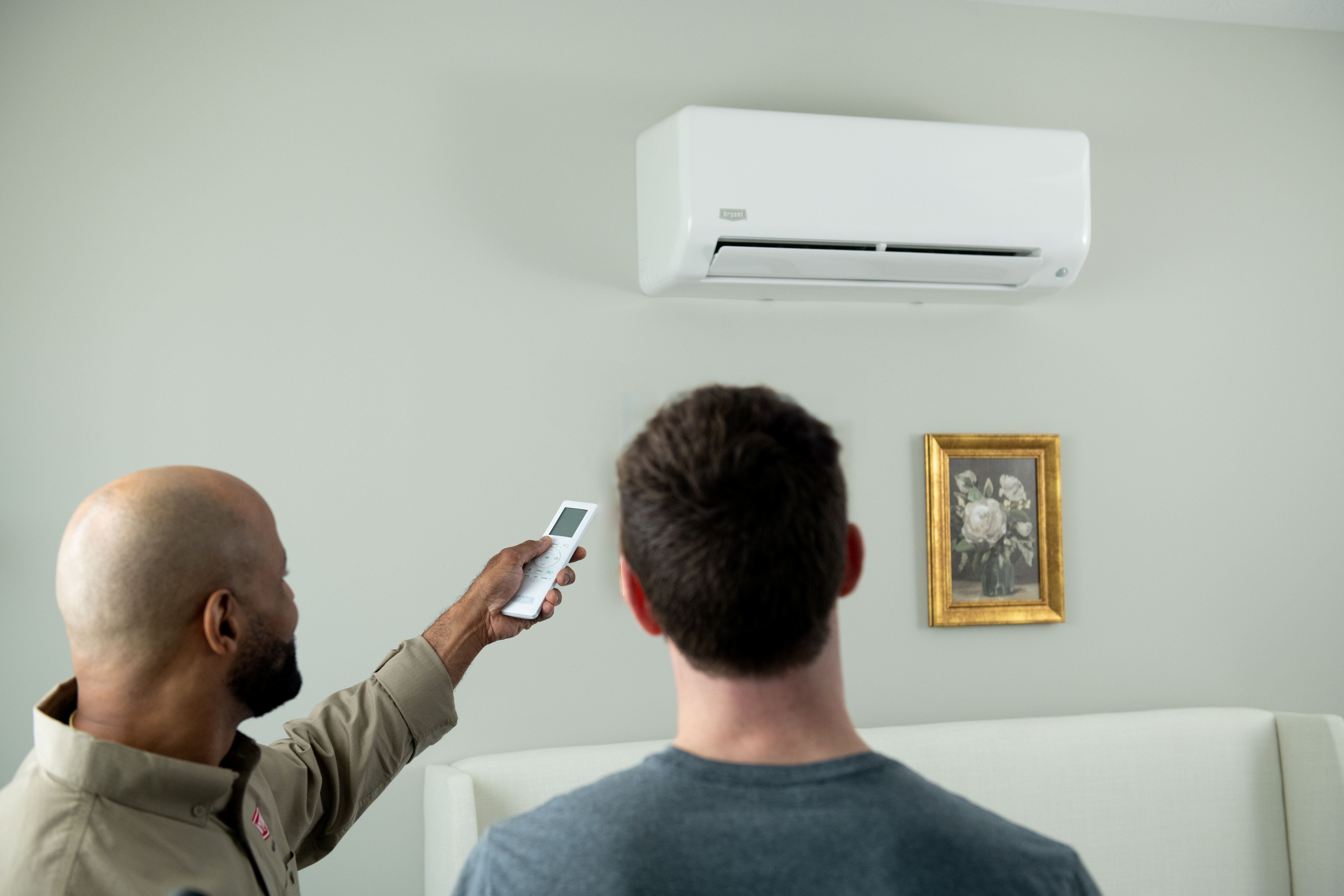Mini Split vs Central Air: Which is Right for Your Home?

What is a Mini Split System?
Key Benefits of Ductless Mini Splits
- Zoned Comfort: With individual air handlers, mini splits enable zoned heating and cooling, letting you set different temperatures in different areas. This is perfect for homes where family members have different comfort preferences.
- High Energy Efficiency: Mini splits are highly energy-efficient because they eliminate the energy loss associated with ductwork, which can account for more than 30% of energy consumption for space conditioning. This often translates to lower utility bills.
- Flexible Installation: Since they don't require ducts, mini split installation is ideal for room additions, converted garages, or older homes without existing ductwork.
- Quiet Operation: The indoor units operate at a whisper-quiet level, creating a peaceful and comfortable environment without the disruptive noise of some traditional HVAC systems.

What is a Central Air Conditioning System?
- Seamless Whole-Home Cooling: One system manages the climate of the entire house, eliminating hot spots and ensuring every corner is comfortable.
- Aesthetically Discreet: With equipment tucked away and only vents visible, central air preserves your home's interior design without bulky wall units.
- Cost-Effective (With Existing Ducts): If your home is already ducted, installing a new central air unit is often more affordable upfront than retrofitting a multi-zone mini split system.
- Ideal for Large Homes: For expansive, multi-story properties, central air efficiently moves large volumes of conditioned air, maintaining a stable environment effortlessly.
Key Benefits of Central Air Conditioning
- Whole-Home Cooling: A single central air system provides consistent and even cooling to every room, ensuring reliable comfort throughout the entire house.
- Aesthetically Discreet: Central AC systems are largely hidden from view. The only visible components are the subtle vents in each room, preserving your home's interior design.
- Lower Initial Cost (with existing ducts): If your home already has ductwork, installing a central air conditioner can be more affordable upfront than installing a multi-zone mini split system.
- Better for Larger Homes: Central air is highly effective for larger, multi-story homes, as it can efficiently distribute cooled air across expansive areas without needing multiple indoor units.
How to Choose: Mini Split vs. Central Air
When deciding between a mini split and central air, the decision often comes down to your home's infrastructure and your specific comfort goals.
Brian Redmond, owner of Redmond’s Complete Comfort in Lock Haven, Pennsylvania, explains that choosing a mini split system often comes down to two main factors: what areas of the home need conditioning and whether the home has existing ductwork.
“If you’re not concerned with conditioning the entire home, a mini split may be a good option,” Redmond said. “Some families have kids who have moved out and only use a few rooms regularly, so they don’t need a central heating and cooling system.”
If a home lacks ductwork or sufficient space to install it properly—which can require a large amount of room—a ductless mini split is often the best solution.
“For example, if a home has a finished basement, we wouldn’t install ductwork,” Redmond added.
5 Factors to Consider Before Buying
- Home Size and Layout: Central air is often more cost-effective for larger, multi-story homes. Mini splits are better suited for smaller homes, individual rooms, or areas where zoned cooling is desired.
- Existing Ductwork: If your home has ducts, central air is typically the more affordable installation. For homes without ducts, like historic properties or new additions, a mini split is the ideal choice.
- Energy Efficiency: Mini splits are generally more energy-efficient due to zoned cooling and the absence of energy loss from leaky ducts. Central air can be less efficient if ducts are not properly sealed.
- Installation and Aesthetics: Central air is discreet, with only vents visible. Mini splits require visible indoor units mounted on walls or ceilings, which can impact your room's aesthetics.
- Upfront Cost vs. Long-Term Value: While central air may be cheaper to swap out if ducts exist, mini splits often provide better long-term ROI through reduced energy consumption.

Consult With A Bryant Dealer On Mini Split vs. Central Air
Mini Split vs Central Air FAQs
- Learn all about what is a mini split
- Read our guide to mini split cost
- Discover the factors in choosing the best mini split
- Learn about the value of a multi zone mini split
- Explore mini split repair
- Learn the ins and outs of mini split maintenance


